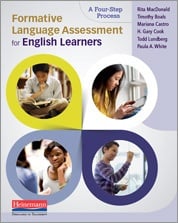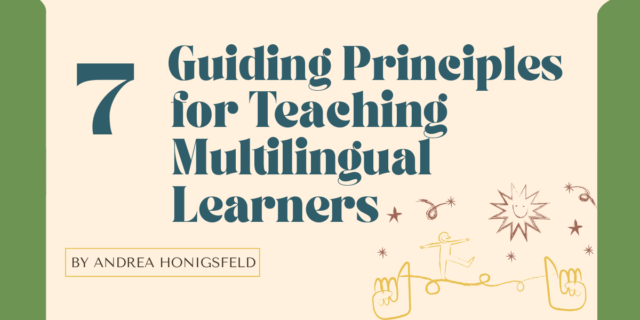
Here's the thing. The significant challenges faced by ELLs become so much greater during middle and high school, when these students must learn more abstract academic concepts with emergent English language skills and differing levels of background knowledge. The research team of Rita MacDonald, Timothy Boals, Mariana Castro, H. Gary Cook, Todd Lundberg, and Paula A. White have your concerns in mind. These authors explain the cycle of formative learning assessment and show how it unfolds in a school setting, all in their new book Formative Language Assessment for English Learners: A Four-Step Process out now.
In today's post adapted from the book, the authors ask and then answer, "What is language assessment for formative purposes?"
What is Language Assessment for Formative Purposes?
by Rita MacDonald, Timothy Boals, Mariana Castro, H. Gary Cook, Todd Lundberg, and Paula A. White
Language assessment for formative purposes is a systematic process of language analysis that provides students and teachers with feedback on students’ progress toward specific instructional goals for using English. ELLs—the many students in American schools who are learning English as an additional language while they learn mathematics and science and social studies—are held to the same accountability standards as their English-proficient peers. Given that ELLs must simultaneously learn new content and a new language, they have been described as having to do “double the work” (Short & Fitzsimmons 2007). To succeed in this challenge, ELLs and their teachers need explicit information about their progress in acquiring knowledge, skills, and academic language. When teachers have the tools and knowledge needed to analyze student language and identify probable language learning trajectories and next steps, they can adjust their instruction accordingly to help students understand and engage actively in language development.
The work of clarifying learning goals is not limited to ELLs, of course. In How People Learn, Bransford, Brown, and Cocking (2000) pointed out that all students need ongoing information about their own progress and learning. In this book, and especially in this chapter, we explore the kind of information about progress and learning that ELLs need and describe a framework for gathering samples of students’ language, analyzing those samples, and providing timely and actionable information, or formative feedback, to students to improve their learning. Formative feedback is information communicated to learners to improve learning (Shute 2008). By extension, formative language feedback is information communicated to learners to support their development of academic language.
Classrooms defined by effective assessment for language for formative purposes become dynamic spaces.
Teachers have always worked to provide students with ongoing feedback on their progress, but this information has not always been specific enough to help students take the next, most attainable step in their academic language development. We’ve discovered in our work with teachers that they are interested in exploring ways to gather, analyze, and share specific information about language development with ELLs. Together with teachers, we’ve developed a process and tools to accomplish these goals. Teachers suggest that effective use of the process helps them gather the type of data they need to adjust ongoing instruction and to deliver the specific, actionable feedback ELLs need to improve their achievement of intended instructional and linguistic outcomes. Classrooms defined by effective assessment for language for formative purposes become dynamic spaces in which teachers and students alike develop deeper understandings of language and then use that information to plan clear, attainable steps to increase their effectiveness in communicating ideas in English.
♦ ♦ ♦ ♦
 Rita MacDonald, Timothy Boals, Mariana Castro, H. Gary Cook, Todd Lundberg, and Paula A. White work together at the Wisconsin Center for Education Research (WCER) at the University of Wisconsin—Madison and have collaborated on formative language assessment for English Language Learners through their work for WIDA (World-Class Instructional Design and Assessment), a 36-state consortium that supports academic language development for linguistically diverse students through standards assessment, research, and professional development.
Rita MacDonald, Timothy Boals, Mariana Castro, H. Gary Cook, Todd Lundberg, and Paula A. White work together at the Wisconsin Center for Education Research (WCER) at the University of Wisconsin—Madison and have collaborated on formative language assessment for English Language Learners through their work for WIDA (World-Class Instructional Design and Assessment), a 36-state consortium that supports academic language development for linguistically diverse students through standards assessment, research, and professional development.


